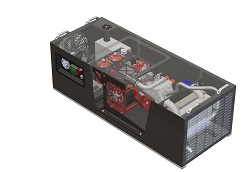Lighter and safer electric cars
Although electric cars have been around for decades, only recently have they begun to be considered a viable solution to the problem of future transportation. Estimates of the electric car market share in the long term vary widely, but in 2020, annual sales of full electric cars are expected to reach around 1 300 000 units worldwide. Danish electric car manufacturer ECOmove has already developed a light car with safety similar to current family cars and optimised electric efficiency, setting new standards for design, usability and sustainability. With the aim of obtaining a best-in-class rating, developments in the EU-funded project BEHICLE(opens in new window) (Best in class vehicle: Safe urban mobility in a sustainable transport value-chain) were focused on fulfilling power and safety requirements as defined by the Euro NCAP protocol. Aiming to fill the gap between M1 vehicles and quadricycles, BEHICLE was centred around improving safety, reducing fuel consumption by optimising the electric drivetrains and reducing component weight, and providing swift acceleration and braking, all according to the best supermini cars currently available on the market. Integration of off-the-shelf powertrain and battery systems helped meet consumption and electric range targets, while conventional manufacturing technologies helped maintain a lightweight structure. Project partners used a mix of different materials, including reinforced flat composite panels, high-strength steel and structural aluminium, to develop a lightweight body-in-white structure. The electric drivetrain comprised of two in-wheel rear electric motors aimed at supplying the target top speed while ensuring minimal consumption. Partners also developed a series of airbags to ensure occupant safety. The protection system includes a driver airbag located in the steering wheel, curtain airbags, thorax airbags and a retractile four point top-belt. BEHICLE combined both ergonomic concepts and advanced automotive technologies that are clean, energy efficient and safe. The project’s new car prototype weights 550 kg and can accelerate up to 100 km within 10 seconds. It also boasts an adequate 150 km of total electric range, with average energy consumption of around 7 kilowatt-hours per 100 km.







